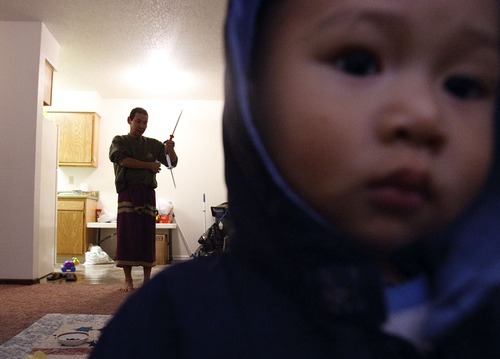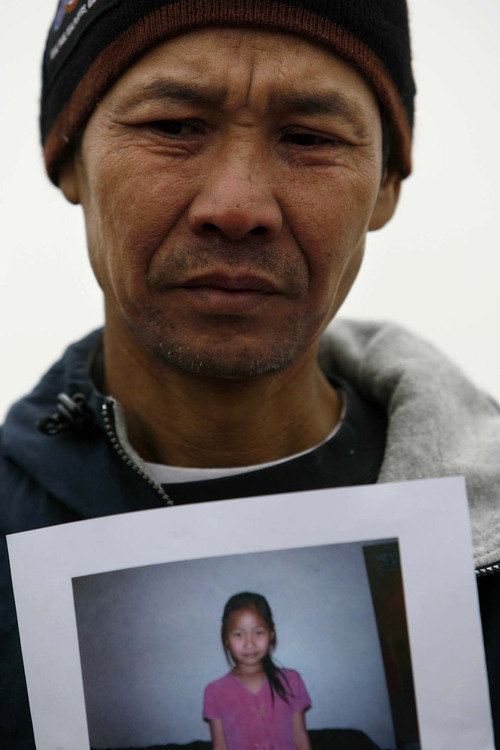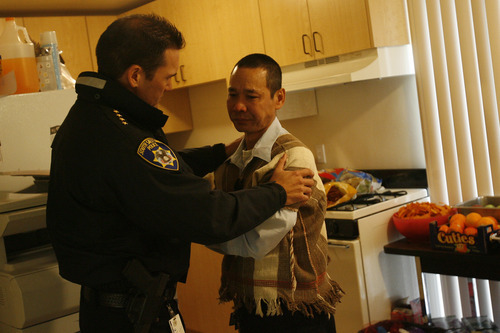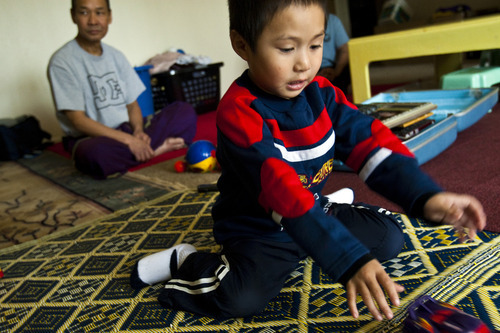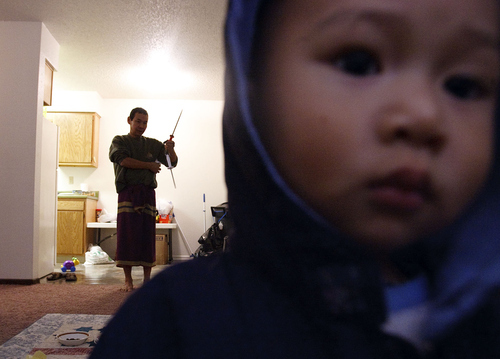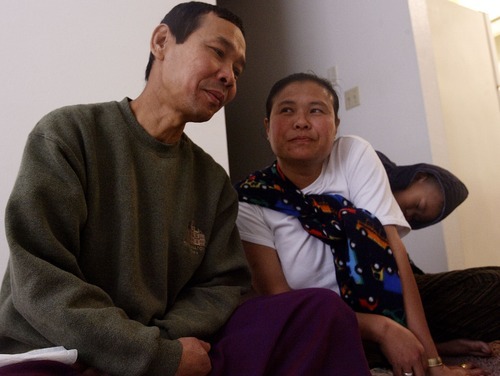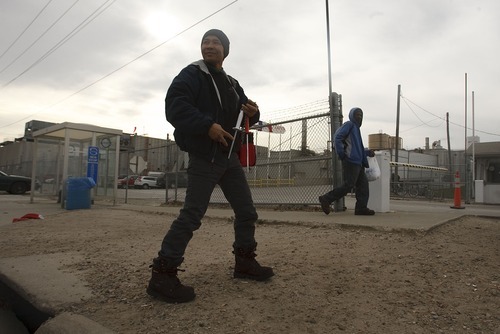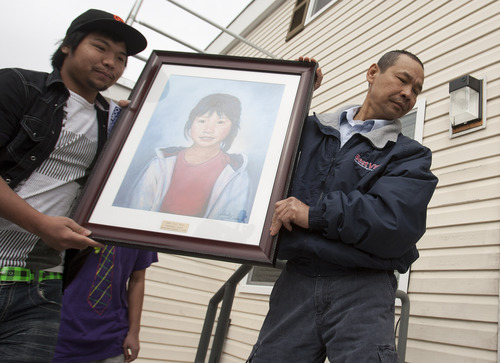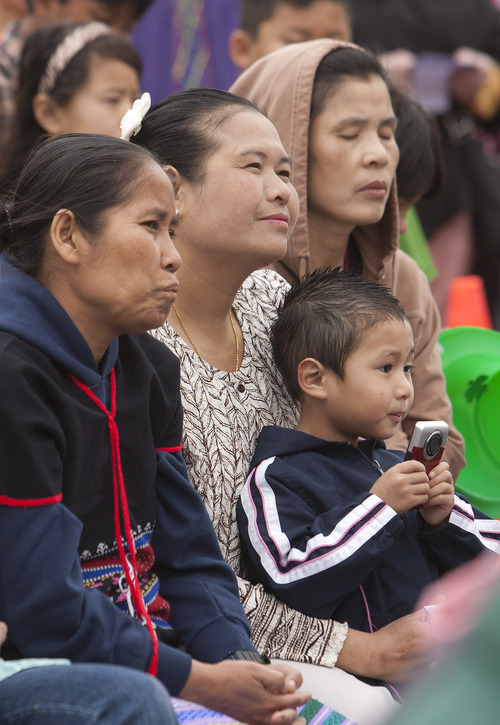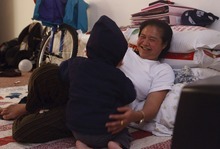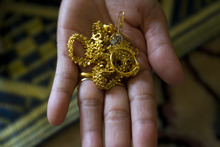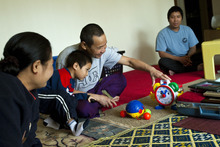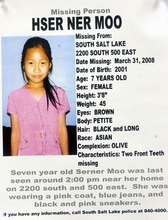This is an archived article that was published on sltrib.com in 2012, and information in the article may be outdated. It is provided only for personal research purposes and may not be reprinted.
The baby had barely opened his eyes when his 7-year-old sister, Hser Ner Moo, left their South Salt Lake apartment and never came back. Four years later, Eh Ler Wah is a typical toddler, racing his fire truck and police car beneath a looming photo of his murdered sister as the family waits for justice.
His parents are convinced they know who killed their only daughter in a horrific crime on March 31, 2008.
"This is your sister," Pearlly Wa tells her youngest son about the girl in pink enshrined on the wall. "Esar Met killed in the United States."
But Esar Met, 25, a refugee from Burma like Hser Ner Moo's family, has repeatedly denied his guilt and behaved erratically in court hearings that veer off in directions that attorneys often don't seem to expect. Plea deals collapse. And questions about the young man's mental status remain.
A preliminary hearing, a significant step toward a jury trial, is scheduled for this June. But one was scheduled for last June, too.
Pearlly Wa and Cartoon Wah, who keep the rest of the photos of their dead daughter locked safe in a blue suitcase, don't know what will happen.
"We're feeling it ourselves," said prosecutor Rob Parrish. "This has taken too long."
A 12-inch thick binder on the Hser Ner Moo crime and all the accompanying documents take up an entire shelf in his office. He says his office is committed to moving the case forward.
—
Whatever the outcome of the murder case, Hser Ner Moo's death irrevocably linked the two refugee families who came to Utah with so much hope. Most of Esar Met's family fled to Arizona shortly after he was charged with the crime. They visit him in jail infrequently.
The year after the murder, Hser Ner Moo's family moved to Iowa and endured a bitterly cold, snowy winter. Cartoon Wah was paid well to work at a meat-packing plant, but they were far from friends and support. The heat of Thailand, where both they and Esar Met's family had lived for years in a dense, primitive refugee camp, was a distant memory.
The families, who hail from different ethnic groups and religions, lived on opposite sides of Mae La Camp. But Esar Met and Hser Ner Moo's family had apartments in the same South Salt Lake complex when the girl, a second-grader, disappeared and was found murdered in Esar Met's basement apartment in 2008.
Esar Met is charged with aggravated murder and child kidnapping for allegedly beating, sexually assaulting and strangling the girl.
In 2009, neighbors and relatives still living in Mae La told The Salt Lake Tribune that Esar Met was "not normal." Growing up, he often sat alone, laughing and talking to himself.
His family has said a friend urged them to have Esar Met's brain "checked," but they didn't think they could afford testing. Unable to remember school lessons, his family said, Esar Met dropped out of school after second grade. His tendency to wander off once led his mother to tie him to a pole.
Esar Met's defense attorneys did not return repeated calls for comment. Parrish, the prosecutor, says defense lawyers had Esar Met's mental competency evaluated about two years ago. Parrish has not seen the results, but said defense attorneys "don't see any reason to believe he's not competent to proceed."
Esar Met's family has said they are confused about the case and their contact with him has been minimal. His mother, Ra He Mar, said she's been unable to communicate via letter because he cannot read.
At least one mental health expert questions whether something has gone wrong.
"The system is broken down," said DJ Ida, a psychologist and executive director of the National Asian American Pacific Islander Mental Health Association, which is not involved in this case. "No one should be sitting there for four years without there being any reasonable movement on a trial."
—
Days after the murder, Esar Met asked during a court hearing who the attorney was in the room. His lawyer, Michael Peterson, told a translator, "Remind him we met twice in the jail."
A December 2008 preliminary hearing was postponed when Esar Met's defense team announced they needed to find a psychologist fluent in Burmese to assess his mental competency.
Since then, the defense has not raised the issue of competency. Under Utah law, a defendant can be mentally ill and still competent to stand trial if he can understand the charges against him and participate in his own defense.
Defense attorneys have instead worked on plea deals, which Esar Met has resisted in court. At a May 2010 court hearing, his legs and hands were shaking. "I was forced by the authorities here to say that I did it, but I didn't kill," he said.
The competency evaluation was done through a translator, not by a Burmese-speaking expert, said Parrish, the prosecutor.
Mental health professionals who work with refugees say how that interview is handled can dramatically affect the outcome.
"I've seen a lot of screw ups," said David Kinzie, a professor of psychiatrry at Oregon Health and Science University's Intercultural Psychiatric Program. "People who make judgments about a person's IQ or intelligence based on American tests." A prisoner's mental health can deteriorate as years pass awaiting trial, said Ida, the psychologist. She questioned whether he is able to understand the legal questions and agreements presented to him.
Anthony Cull, another OHSU psychiatrist who works specifically with Burmese refugees, has noted a pattern of dissociative behavior ranging from laughing and crying to screaming and assaulting family members.
"They calm down later and they claim to not remember doing that at all," he said.
—
For Eh Ler Wah's fourth birthday, his family decorated their small apartment with pink, green and orange balloons strung on twirling streamers, hanging by the big photo of Hser Ner Moo. Cartoon Wah, whose family moved back to Utah in 2010, worries about Eh Ler Wah wandering out of the apartment and always remembers to keep the door locked.
If Hser Ner Moo were alive today, her parents imagine the talkative, energetic girl would have been by her mother's side in the kitchen and happily going to school. They've kept all her clothes, from a pirate Halloween costume to her white school blouse from Thailand.
Some of Hser Ner Moo's toys, including a white plastic clock, are now in Eh Ler Wah's toy box.
Pearlly Wah wants Esar Met to go to prison "forever."
"He's so bad for my family," she said. "I had only one daughter."
Hser Ner Moo anniversary vigil
A candlelight vigil will take place at 5 p.m. Saturday at the community center named after her at South Parc, 479 E 2250 S in South Salt Lake. —
What is a refugee?
A refugee is a legal immigrant brought to the U.S. by the government because of persecution or threat of persecution. About 25,000 refugees live in Utah. To find out more or to volunteer, go to refugee.utah.gov.
Esar Met and Hser Ner Moo's families are among the hundreds of thousands of refugees who have left Burma, now known as Myanmar, fleeing the repressive regime's pattern of forced labor and war against ethnic groups. More than 100,000 refugees live in camps on the western edge of Thailand.


